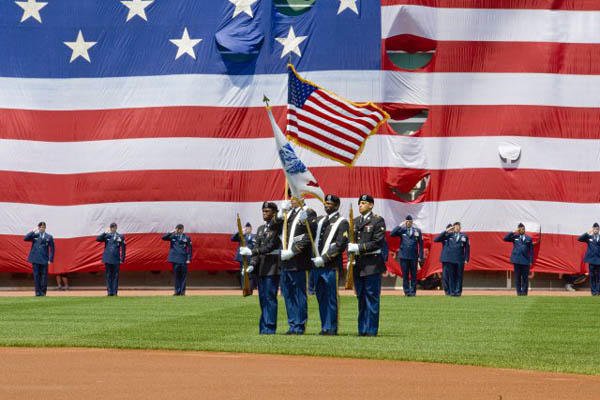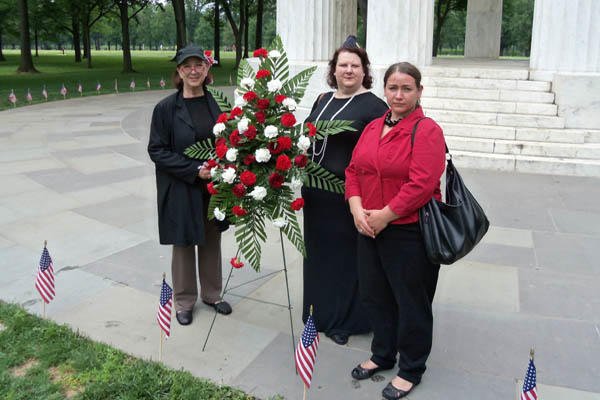A small but resolute band of sequestration-busters showed up on the National Mall Sunday to honor the fallen of World War I despite the official cancellation of the annual event leading up to Memorial Day due to the Congressional budget cuts.
“It’s a sign that we remember,” said Melinda Tomaino, president of the American Legion auxiliary at the Kenneth H. Nash Post 8 on Capitol Hill in Washington, D.C.
She was joined by Barbara Rich and Alicia Fansmith, also members of Post 8, in placing two wreaths at the District of Columbia’s World War I Memorial, dedicated in 1931 by President Herbert Hoover, that mostly goes unnoticed a short walk from the imposing World War II Memorial.
“Remembrance of our veterans who sacrificed all should not be sequestered,” Rich said.
The three women held a brief moment of silence to honor those who served in what the inscription on the D.C. Memorial said was “The Great War For Civilization.” Earlier, Rebekah Wilson, an Army Iraq veteran, had placed small U.S. flags along walkways leading to the Memorial just off Independence Ave.
And that was it in the way of ceremony for what had been an annual gathering going back to 1976 to kick off Memorial Day events.
There were no speakers, no representatives from D.C. officialdom. There was no playing of “Taps,” no folding chairs for whoever might have attended in remembrance of the 499 District residents who fell in the Great War alongside 116,000 other “doughboys.”
The National Park Service withdrew its support for the District event, which usually came to about $1,000, because of the five percent cuts in the NPS’ budget of about $2.75 billion that were forced by the impasse between Congress and the Obama administration on deficit reduction, said Mike Litterst, an NPS spokesman.
Sequestration could result in more than $1 trillion in federal spending cuts over the next 10 years to include more than $500 billion for the Defense Department. Those cuts have been felt in the national preparations for Memorial Day.
Several other NPS sites were being closed for Memorial Day, Litterst said. The military was also scaling back its participation in events to honor the more than 1,322,000 who have been killed in the nation’s wars since the Revolution.
Other NPS sites that will be closed for Memorial Day included the Brown v. Board of Education National Historic Site in Washiongton, D.C.; the Harry S Truman National Historic Site in Missiouri; the James A. Garfield National Historic Site in Ohio and the Voyageurs National Park in Minnesota.
At the Homestead National Monument of America in Nebraska, hours for the annual Fiddle Festival were being cut back, along with the shuttle bus transportation.
The military was also working under severe funding constraints in its ability to support Memorial Day ceremonies and a range of community events nationwide. The support in the form of troops, color guards, bands, drill teams and fly-bys was previously considered routine.
The hugely popular Air Force Thunderbirds and the Navy’s Blue Angels aerial acrobatics teams have also been grounded. The Navy has dropped out of the annual Fleet Week in New York City for Memorial Day weekend to save $7 million.
“It grows every day,” said Air Force Col. Phil Waite, the director of Community and Public Outreach at the Pentagon. He said the number of events that the military will be unable to support this year.
Memorial Day “is significant in the life of our nation, especially for the families of the fallen,” Waite said. The Defense Department was “considering certain exceptions to the restrictions imposed by sequestration on our outreach programs, but no specific determination has been released yet."
Under the current restrictions, units that are called upon frequently for public events, such as the military bands, have had to cut back on travel.
“If it’s anything outside the local area” where the unit is based, “they’re not going to be able to do it,” Waite said.
In the vacuum, private and non-profit groups have been stepping in to provide support. A fleet of World War II-vintage fighters and bombers from the National Museum of World War II Aviation in Colorado Springs and the Texas Flying Legends Museum of Houston will sub for the Air Force Thunderbirds at the Air Force Academy’s graduation ceremony on May 29.
The cancellation of community events by the military and the scaling back of support for Memorial Day was having an impact on the Defense Department’s programs for keeping the all-volunteer force in touch with the public.
“The American public is losing here in not being able to see our military, not being able to be inspired by them,” Waite said at the Pentagon. “It all points to the fact that sequester is very painful.”
The lonely vigil by the three women at the D.C. Memorial only underlined the fact that there is no national memorial for the Great War in which more than two million Americans served. Congressional attempts to establish a World War I memorial on the National Mall have languished as the last survivors have died.
Army Corp. Frank Buckles, an ambulance driver in World War I, died at his home in Charles Town, W.Va., in 2011. He was the last living American veteran of the Great War. Buckles was 110.
Navy Yeoman Charlotte Winters, the last woman survivor of World War I, died in 2007. She was 109, and had been a founding member of the Jacob Jones American Legion post 2 in Washington, D.C.
Before his death, Buckles lobbied Congress for a memorial to his comrades. Before he died, Buckles left his memories of the war with the Veterans History Project at the Library of Congress. In the oral history, Buckles recalled marveling at French troops on the eve of battle.
“What I have a vivid memory of is the French soldiers being in a small village and going in to a local wine shop in the evening,” Buckles said. “They had very, very little money. But they were having wine and singing the ‘Marseillaise’ with enthusiasm. And I inquired, ‘What is the occasion?’ They were going back to the front. Can you imagine that?”





























